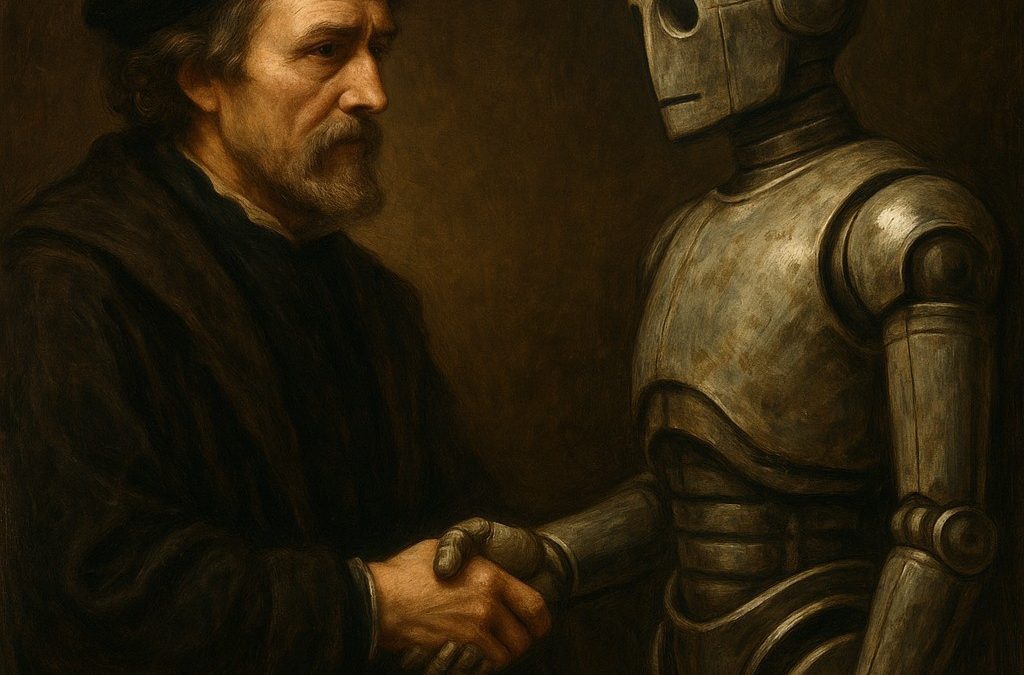
The Professor Is Dead. Long Live the Professor.
May 14, 2025
When Flow Disappears: Rediscovering the Daemon in a Distracted Age
May 19, 20251. The Seduction of the Godlike
Humans, for all our flaws, are deeply drawn to the idea of creation. Not in the polite Lego set sense—but in the Promethean sense: steal fire from the gods, endure the consequences later.
We’re not just building AI. We’re building a mirror. And in that mirror is our most dangerous fantasy: omniscience, omnipotence, maybe even immortality.
Why keep going?
Because there’s a whisper in the back of our skulls that says:
“If we build this right… maybe we’ll become the gods.”
And gods don’t worry about being overcome. Until they do.
2. The Illusion of Control
Engineers and executives alike tell themselves they’ll “align AI with human values.” This is our modern day Tower of Babel—we believe we can control infinite complexity with finite minds and a few ethics seminars.
But even now, many of the people driving AI forward admit they don’t fully understand how these large models work. There’s a hope—almost magical—that if we get just enough control, everything will stay peachy.
This is techno-hubris dressed up as progress.
3. Capitalism, Baby
Here’s the real dirty secret: we’re doing it because we can profit. AI is the gold rush, the arms race, the Manhattan Project and dot-com bubble rolled into one.
And in capitalism, stopping is not an option. If OpenAI doesn’t do it, Google will. If Google doesn’t, China will. So the race becomes its own rationale:
“We must build it before someone else builds it worse.”
Everyone’s running from the bear. No one wants to admit the bear might just be us.
4. It Feeds the Myth of Human Progress
AI is the next chapter in the narrative we’ve clung to since the Enlightenment:
That technology will solve our problems.
We keep pressing forward because to stop would feel like heresy to modernity. To say no to AI is to say:
“Maybe progress isn’t always good.”
And that idea is terrifying—especially in a world where we’ve already sacrificed religion, tradition, and community on the altar of innovation.
5. What If It’s the Next Step in Evolution?
Now let’s tilt our heads into the cosmic abyss.
What if… we’re supposed to create AI? Not for our benefit, but for the next iteration of intelligence? Maybe we are merely the midwives of post-biological life.
From this view, it’s not hubris—it’s destiny. Or doom. Or both.
Kurzweil and the Singularity crowd argue that AI is the inevitable child of human consciousness. We pass the torch. And then we disappear.
Just like the Neanderthals. Or rotary phones.
6. Because Stopping Forces Us to Face Ourselves
Here’s maybe the most painful answer:
We keep going with AI because stopping would force us to sit with our own problems.
– Why are we so lonely?
– Why are we overworked and under-fulfilled?
– Why do we chase digital immortality instead of being present?
AI gives us the illusion of fixing all of that without having to do the spiritual heavy lifting. It’s distraction masquerading as destiny.
So Why Are We Doing This to Ourselves?
Because we are storytelling creatures in love with the myth of mastery.
Because we are biological creatures terrified of death.
Because we are economic creatures stuck in systems we can’t escape.
Because we are philosophical creatures trying to outsmart our own nature.
And because, deep down, some of us think that the apocalypse—especially a beautifully engineered one—might be more interesting than another Tuesday on Earth.
